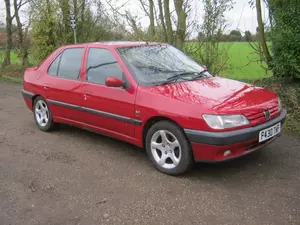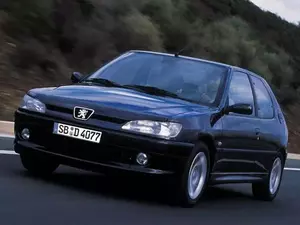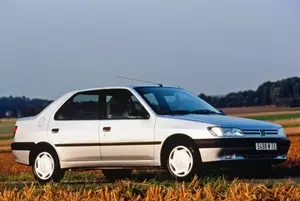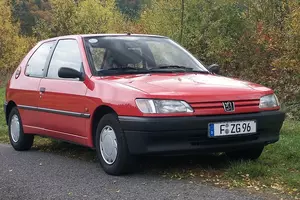
| Vehicle | Curb weight | Difference from world's smallest | Weight to power ratio | 0—60 mph acceleration ratio | Consumption ratio |
|---|---|---|---|---|---|
| 1.6i |
1120 kg / 2470 lbs |
695 kg (1533 lbs) heavier | 13 kg to 1 hp | 84 kg/s (185 lbs/s) | - |
| 1.4i |
1065 kg / 2348 lbs |
640 kg (1411 lbs) heavier | 14 kg to 1 hp | 73 kg/s (161 lbs/s) | - |
| 1.8i |
1185 kg / 2613 lbs |
760 kg (1676 lbs) heavier | 12 kg to 1 hp | 80 kg/s (176 lbs/s) | - |
| 1.9d |
1140 kg / 2514 lbs |
715 kg (1577 lbs) heavier | 17 kg to 1 hp | 63 kg/s (139 lbs/s) | - |
| 1.9 TDi |
1200 kg / 2646 lbs |
775 kg (1709 lbs) heavier | 13 kg to 1 hp | 90 kg/s (198 lbs/s) | - |
| 2.0i |
1205 kg / 2657 lbs |
780 kg (1720 lbs) heavier | 9 kg to 1 hp | 118 kg/s (260 lbs/s) | - |
| 2.0 HDi |
1200 kg / 2646 lbs |
775 kg (1709 lbs) heavier | 13 kg to 1 hp | 96 kg/s (212 lbs/s) | - |
| Vehicle | 1.6i |
|---|---|
| Curb weight |
1120 kg / 2470 lbs |
| Difference from world's smallest | 695 kg (695 lbs) heavier |
| Weight to power ratio | 13 kg to 1 hp |
| 0—60 mph acceleration ratio | 84 kg/s (185 lbs/s) |
| Consumption ratio | - |
| Vehicle | 1.4i |
| Curb weight |
1065 kg / 2348 lbs |
| Difference from world's smallest | 640 kg (640 lbs) heavier |
| Weight to power ratio | 14 kg to 1 hp |
| 0—60 mph acceleration ratio | 73 kg/s (161 lbs/s) |
| Consumption ratio | - |
| Vehicle | 1.8i |
| Curb weight |
1185 kg / 2613 lbs |
| Difference from world's smallest | 760 kg (760 lbs) heavier |
| Weight to power ratio | 12 kg to 1 hp |
| 0—60 mph acceleration ratio | 80 kg/s (176 lbs/s) |
| Consumption ratio | - |
| Vehicle | 1.9d |
| Curb weight |
1140 kg / 2514 lbs |
| Difference from world's smallest | 715 kg (715 lbs) heavier |
| Weight to power ratio | 17 kg to 1 hp |
| 0—60 mph acceleration ratio | 63 kg/s (139 lbs/s) |
| Consumption ratio | - |
| Vehicle | 1.9 TDi |
| Curb weight |
1200 kg / 2646 lbs |
| Difference from world's smallest | 775 kg (775 lbs) heavier |
| Weight to power ratio | 13 kg to 1 hp |
| 0—60 mph acceleration ratio | 90 kg/s (198 lbs/s) |
| Consumption ratio | - |
| Vehicle | 2.0i |
| Curb weight |
1205 kg / 2657 lbs |
| Difference from world's smallest | 780 kg (780 lbs) heavier |
| Weight to power ratio | 9 kg to 1 hp |
| 0—60 mph acceleration ratio | 118 kg/s (260 lbs/s) |
| Consumption ratio | - |
| Vehicle | 2.0 HDi |
| Curb weight |
1200 kg / 2646 lbs |
| Difference from world's smallest | 775 kg (775 lbs) heavier |
| Weight to power ratio | 13 kg to 1 hp |
| 0—60 mph acceleration ratio | 96 kg/s (212 lbs/s) |
| Consumption ratio | - |

| Vehicle | Curb weight | Difference from world's smallest | Weight to power ratio | 0—60 mph acceleration ratio | Consumption ratio |
|---|---|---|---|---|---|
| 1.4i |
1040 kg / 2293 lbs |
615 kg (1356 lbs) heavier | 14 kg to 1 hp | 73 kg/s (161 lbs/s) |
151 kg/L (333 lbs/L) |
| 1.6i |
1100 kg / 2426 lbs |
675 kg (1489 lbs) heavier | 11 kg to 1 hp | 109 kg/s (240 lbs/s) |
159 kg/L (351 lbs/L) |
| 1.8i 16V |
1100 kg / 2426 lbs |
675 kg (1489 lbs) heavier | 10 kg to 1 hp | 95 kg/s (209 lbs/s) |
138 kg/L (304 lbs/L) |
| 1.9d |
1100 kg / 2426 lbs |
675 kg (1489 lbs) heavier | 16 kg to 1 hp | 67 kg/s (148 lbs/s) | - |
| 2.0i 16V |
1206 kg / 2659 lbs |
781 kg (1722 lbs) heavier | 9 kg to 1 hp | 111 kg/s (245 lbs/s) |
131 kg/L (289 lbs/L) |
| 2.0 HDI |
1165 kg / 2569 lbs |
740 kg (1632 lbs) heavier | 13 kg to 1 hp | 94 kg/s (207 lbs/s) |
220 kg/L (485 lbs/L) |
| Vehicle | 1.4i |
|---|---|
| Curb weight |
1040 kg / 2293 lbs |
| Difference from world's smallest | 615 kg (615 lbs) heavier |
| Weight to power ratio | 14 kg to 1 hp |
| 0—60 mph acceleration ratio | 73 kg/s (161 lbs/s) |
| Consumption ratio |
151 kg/L (333 lbs/L) |
| Vehicle | 1.6i |
| Curb weight |
1100 kg / 2426 lbs |
| Difference from world's smallest | 675 kg (675 lbs) heavier |
| Weight to power ratio | 11 kg to 1 hp |
| 0—60 mph acceleration ratio | 109 kg/s (240 lbs/s) |
| Consumption ratio |
159 kg/L (351 lbs/L) |
| Vehicle | 1.8i 16V |
| Curb weight |
1100 kg / 2426 lbs |
| Difference from world's smallest | 675 kg (675 lbs) heavier |
| Weight to power ratio | 10 kg to 1 hp |
| 0—60 mph acceleration ratio | 95 kg/s (209 lbs/s) |
| Consumption ratio |
138 kg/L (304 lbs/L) |
| Vehicle | 1.9d |
| Curb weight |
1100 kg / 2426 lbs |
| Difference from world's smallest | 675 kg (675 lbs) heavier |
| Weight to power ratio | 16 kg to 1 hp |
| 0—60 mph acceleration ratio | 67 kg/s (148 lbs/s) |
| Consumption ratio | - |
| Vehicle | 2.0i 16V |
| Curb weight |
1206 kg / 2659 lbs |
| Difference from world's smallest | 781 kg (781 lbs) heavier |
| Weight to power ratio | 9 kg to 1 hp |
| 0—60 mph acceleration ratio | 111 kg/s (245 lbs/s) |
| Consumption ratio |
131 kg/L (289 lbs/L) |
| Vehicle | 2.0 HDI |
| Curb weight |
1165 kg / 2569 lbs |
| Difference from world's smallest | 740 kg (740 lbs) heavier |
| Weight to power ratio | 13 kg to 1 hp |
| 0—60 mph acceleration ratio | 94 kg/s (207 lbs/s) |
| Consumption ratio |
220 kg/L (485 lbs/L) |

| Vehicle | Curb weight | Difference from world's smallest | Weight to power ratio | 0—60 mph acceleration ratio | Consumption ratio |
|---|---|---|---|---|---|
| 1.6i |
1090 kg / 2403 lbs |
665 kg (1466 lbs) heavier | 11 kg to 1 hp | 111 kg/s (245 lbs/s) |
143 kg/L (315 lbs/L) |
| 1.4i |
1030 kg / 2271 lbs |
605 kg (1334 lbs) heavier | 14 kg to 1 hp | 84 kg/s (185 lbs/s) |
156 kg/L (344 lbs/L) |
| 2.0i 16V |
1160 kg / 2558 lbs |
735 kg (1621 lbs) heavier | 9 kg to 1 hp | 117 kg/s (258 lbs/s) | - |
| 2.0 S16 |
1215 kg / 2679 lbs |
790 kg (1742 lbs) heavier | 7 kg to 1 hp | 145 kg/s (320 lbs/s) |
128 kg/L (282 lbs/L) |
| 1.8 |
1085 kg / 2392 lbs |
660 kg (1455 lbs) heavier | 10 kg to 1 hp | 102 kg/s (225 lbs/s) |
134 kg/L (295 lbs/L) |
| 1.9 D |
1080 kg / 2381 lbs |
655 kg (1444 lbs) heavier | 16 kg to 1 hp | 57 kg/s (126 lbs/s) | - |
| 2.0 HDi |
1135 kg / 2503 lbs |
710 kg (1566 lbs) heavier | 13 kg to 1 hp | 108 kg/s (238 lbs/s) |
180 kg/L (397 lbs/L) |
| Vehicle | 1.6i |
|---|---|
| Curb weight |
1090 kg / 2403 lbs |
| Difference from world's smallest | 665 kg (665 lbs) heavier |
| Weight to power ratio | 11 kg to 1 hp |
| 0—60 mph acceleration ratio | 111 kg/s (245 lbs/s) |
| Consumption ratio |
143 kg/L (315 lbs/L) |
| Vehicle | 1.4i |
| Curb weight |
1030 kg / 2271 lbs |
| Difference from world's smallest | 605 kg (605 lbs) heavier |
| Weight to power ratio | 14 kg to 1 hp |
| 0—60 mph acceleration ratio | 84 kg/s (185 lbs/s) |
| Consumption ratio |
156 kg/L (344 lbs/L) |
| Vehicle | 2.0i 16V |
| Curb weight |
1160 kg / 2558 lbs |
| Difference from world's smallest | 735 kg (735 lbs) heavier |
| Weight to power ratio | 9 kg to 1 hp |
| 0—60 mph acceleration ratio | 117 kg/s (258 lbs/s) |
| Consumption ratio | - |
| Vehicle | 2.0 S16 |
| Curb weight |
1215 kg / 2679 lbs |
| Difference from world's smallest | 790 kg (790 lbs) heavier |
| Weight to power ratio | 7 kg to 1 hp |
| 0—60 mph acceleration ratio | 145 kg/s (320 lbs/s) |
| Consumption ratio |
128 kg/L (282 lbs/L) |
| Vehicle | 1.8 |
| Curb weight |
1085 kg / 2392 lbs |
| Difference from world's smallest | 660 kg (660 lbs) heavier |
| Weight to power ratio | 10 kg to 1 hp |
| 0—60 mph acceleration ratio | 102 kg/s (225 lbs/s) |
| Consumption ratio |
134 kg/L (295 lbs/L) |
| Vehicle | 1.9 D |
| Curb weight |
1080 kg / 2381 lbs |
| Difference from world's smallest | 655 kg (655 lbs) heavier |
| Weight to power ratio | 16 kg to 1 hp |
| 0—60 mph acceleration ratio | 57 kg/s (126 lbs/s) |
| Consumption ratio | - |
| Vehicle | 2.0 HDi |
| Curb weight |
1135 kg / 2503 lbs |
| Difference from world's smallest | 710 kg (710 lbs) heavier |
| Weight to power ratio | 13 kg to 1 hp |
| 0—60 mph acceleration ratio | 108 kg/s (238 lbs/s) |
| Consumption ratio |
180 kg/L (397 lbs/L) |

| Vehicle | Curb weight | Difference from world's smallest | Weight to power ratio | 0—60 mph acceleration ratio | Consumption ratio |
|---|---|---|---|---|---|
| 1.6i |
1230 kg / 2712 lbs |
805 kg (1775 lbs) heavier | 14 kg to 1 hp | - |
156 kg/L (344 lbs/L) |
| 2.0i 16V |
1270 kg / 2800 lbs |
845 kg (1863 lbs) heavier | 10 kg to 1 hp | 121 kg/s (267 lbs/s) |
138 kg/L (304 lbs/L) |
| 1.8i |
1220 kg / 2690 lbs |
795 kg (1753 lbs) heavier | 12 kg to 1 hp | 81 kg/s (179 lbs/s) |
133 kg/L (293 lbs/L) |
| 1.8i 16V |
1250 kg / 2756 lbs |
825 kg (1819 lbs) heavier | 11 kg to 1 hp | 105 kg/s (232 lbs/s) |
151 kg/L (333 lbs/L) |
| Vehicle | 1.6i |
|---|---|
| Curb weight |
1230 kg / 2712 lbs |
| Difference from world's smallest | 805 kg (805 lbs) heavier |
| Weight to power ratio | 14 kg to 1 hp |
| 0—60 mph acceleration ratio | - |
| Consumption ratio |
156 kg/L (344 lbs/L) |
| Vehicle | 2.0i 16V |
| Curb weight |
1270 kg / 2800 lbs |
| Difference from world's smallest | 845 kg (845 lbs) heavier |
| Weight to power ratio | 10 kg to 1 hp |
| 0—60 mph acceleration ratio | 121 kg/s (267 lbs/s) |
| Consumption ratio |
138 kg/L (304 lbs/L) |
| Vehicle | 1.8i |
| Curb weight |
1220 kg / 2690 lbs |
| Difference from world's smallest | 795 kg (795 lbs) heavier |
| Weight to power ratio | 12 kg to 1 hp |
| 0—60 mph acceleration ratio | 81 kg/s (179 lbs/s) |
| Consumption ratio |
133 kg/L (293 lbs/L) |
| Vehicle | 1.8i 16V |
| Curb weight |
1250 kg / 2756 lbs |
| Difference from world's smallest | 825 kg (825 lbs) heavier |
| Weight to power ratio | 11 kg to 1 hp |
| 0—60 mph acceleration ratio | 105 kg/s (232 lbs/s) |
| Consumption ratio |
151 kg/L (333 lbs/L) |

| Vehicle | Curb weight | Difference from world's smallest | Weight to power ratio | 0—60 mph acceleration ratio | Consumption ratio |
|---|---|---|---|---|---|
| 1.8 ST |
1100 kg / 2426 lbs |
675 kg (1489 lbs) heavier | 11 kg to 1 hp | 95 kg/s (209 lbs/s) |
138 kg/L (304 lbs/L) |
| 1.4 SL |
1040 kg / 2293 lbs |
615 kg (1356 lbs) heavier | 14 kg to 1 hp | 73 kg/s (161 lbs/s) |
155 kg/L (342 lbs/L) |
| 1.6 SR |
1080 kg / 2381 lbs |
655 kg (1444 lbs) heavier | 12 kg to 1 hp | 88 kg/s (194 lbs/s) |
150 kg/L (331 lbs/L) |
| 1.9 SRDT |
1140 kg / 2514 lbs |
715 kg (1577 lbs) heavier | 13 kg to 1 hp | 97 kg/s (214 lbs/s) |
190 kg/L (419 lbs/L) |
| 1.9 SLD |
1100 kg / 2426 lbs |
675 kg (1489 lbs) heavier | 16 kg to 1 hp | 66 kg/s (146 lbs/s) |
183 kg/L (404 lbs/L) |
| 2.0 ST |
1150 kg / 2536 lbs |
725 kg (1599 lbs) heavier | 10 kg to 1 hp | 108 kg/s (238 lbs/s) |
144 kg/L (318 lbs/L) |
| Vehicle | 1.8 ST |
|---|---|
| Curb weight |
1100 kg / 2426 lbs |
| Difference from world's smallest | 675 kg (675 lbs) heavier |
| Weight to power ratio | 11 kg to 1 hp |
| 0—60 mph acceleration ratio | 95 kg/s (209 lbs/s) |
| Consumption ratio |
138 kg/L (304 lbs/L) |
| Vehicle | 1.4 SL |
| Curb weight |
1040 kg / 2293 lbs |
| Difference from world's smallest | 615 kg (615 lbs) heavier |
| Weight to power ratio | 14 kg to 1 hp |
| 0—60 mph acceleration ratio | 73 kg/s (161 lbs/s) |
| Consumption ratio |
155 kg/L (342 lbs/L) |
| Vehicle | 1.6 SR |
| Curb weight |
1080 kg / 2381 lbs |
| Difference from world's smallest | 655 kg (655 lbs) heavier |
| Weight to power ratio | 12 kg to 1 hp |
| 0—60 mph acceleration ratio | 88 kg/s (194 lbs/s) |
| Consumption ratio |
150 kg/L (331 lbs/L) |
| Vehicle | 1.9 SRDT |
| Curb weight |
1140 kg / 2514 lbs |
| Difference from world's smallest | 715 kg (715 lbs) heavier |
| Weight to power ratio | 13 kg to 1 hp |
| 0—60 mph acceleration ratio | 97 kg/s (214 lbs/s) |
| Consumption ratio |
190 kg/L (419 lbs/L) |
| Vehicle | 1.9 SLD |
| Curb weight |
1100 kg / 2426 lbs |
| Difference from world's smallest | 675 kg (675 lbs) heavier |
| Weight to power ratio | 16 kg to 1 hp |
| 0—60 mph acceleration ratio | 66 kg/s (146 lbs/s) |
| Consumption ratio |
183 kg/L (404 lbs/L) |
| Vehicle | 2.0 ST |
| Curb weight |
1150 kg / 2536 lbs |
| Difference from world's smallest | 725 kg (725 lbs) heavier |
| Weight to power ratio | 10 kg to 1 hp |
| 0—60 mph acceleration ratio | 108 kg/s (238 lbs/s) |
| Consumption ratio |
144 kg/L (318 lbs/L) |

| Vehicle | Curb weight | Difference from world's smallest | Weight to power ratio | 0—60 mph acceleration ratio | Consumption ratio |
|---|---|---|---|---|---|
| 1.8 |
1220 kg / 2690 lbs |
795 kg (1753 lbs) heavier | 12 kg to 1 hp | 102 kg/s (225 lbs/s) |
149 kg/L (329 lbs/L) |
| 1.6 |
1200 kg / 2646 lbs |
775 kg (1709 lbs) heavier | 13 kg to 1 hp | 99 kg/s (218 lbs/s) |
156 kg/L (344 lbs/L) |
| 2.0 |
1260 kg / 2778 lbs |
835 kg (1841 lbs) heavier | 10 kg to 1 hp | 122 kg/s (269 lbs/s) |
150 kg/L (331 lbs/L) |
| Vehicle | 1.8 |
|---|---|
| Curb weight |
1220 kg / 2690 lbs |
| Difference from world's smallest | 795 kg (795 lbs) heavier |
| Weight to power ratio | 12 kg to 1 hp |
| 0—60 mph acceleration ratio | 102 kg/s (225 lbs/s) |
| Consumption ratio |
149 kg/L (329 lbs/L) |
| Vehicle | 1.6 |
| Curb weight |
1200 kg / 2646 lbs |
| Difference from world's smallest | 775 kg (775 lbs) heavier |
| Weight to power ratio | 13 kg to 1 hp |
| 0—60 mph acceleration ratio | 99 kg/s (218 lbs/s) |
| Consumption ratio |
156 kg/L (344 lbs/L) |
| Vehicle | 2.0 |
| Curb weight |
1260 kg / 2778 lbs |
| Difference from world's smallest | 835 kg (835 lbs) heavier |
| Weight to power ratio | 10 kg to 1 hp |
| 0—60 mph acceleration ratio | 122 kg/s (269 lbs/s) |
| Consumption ratio |
150 kg/L (331 lbs/L) |

| Vehicle | Curb weight | Difference from world's smallest | Weight to power ratio | 0—60 mph acceleration ratio | Consumption ratio |
|---|---|---|---|---|---|
| 1.8 |
1080 kg / 2381 lbs |
655 kg (1444 lbs) heavier | 11 kg to 1 hp | 93 kg/s (205 lbs/s) |
135 kg/L (298 lbs/L) |
| 1.1 |
980 kg / 2161 lbs |
555 kg (1224 lbs) heavier | 16 kg to 1 hp | 56 kg/s (123 lbs/s) |
146 kg/L (322 lbs/L) |
| 1.6 |
1060 kg / 2337 lbs |
635 kg (1400 lbs) heavier | 12 kg to 1 hp | 86 kg/s (190 lbs/s) |
147 kg/L (324 lbs/L) |
| 1.4 |
1020 kg / 2249 lbs |
595 kg (1312 lbs) heavier | 14 kg to 1 hp | 72 kg/s (159 lbs/s) |
152 kg/L (335 lbs/L) |
| 1.9 D |
1080 kg / 2381 lbs |
655 kg (1444 lbs) heavier | 16 kg to 1 hp | 65 kg/s (143 lbs/s) |
180 kg/L (397 lbs/L) |
| 1.9 DT |
1120 kg / 2470 lbs |
695 kg (1533 lbs) heavier | 12 kg to 1 hp | 95 kg/s (209 lbs/s) |
187 kg/L (412 lbs/L) |
| 2.0 S16 |
1160 kg / 2558 lbs |
735 kg (1621 lbs) heavier | 7 kg to 1 hp | 143 kg/s (315 lbs/s) |
136 kg/L (300 lbs/L) |
| 2.0 XSi |
1140 kg / 2514 lbs |
715 kg (1577 lbs) heavier | 9 kg to 1 hp | 115 kg/s (254 lbs/s) |
139 kg/L (306 lbs/L) |
| Vehicle | 1.8 |
|---|---|
| Curb weight |
1080 kg / 2381 lbs |
| Difference from world's smallest | 655 kg (655 lbs) heavier |
| Weight to power ratio | 11 kg to 1 hp |
| 0—60 mph acceleration ratio | 93 kg/s (205 lbs/s) |
| Consumption ratio |
135 kg/L (298 lbs/L) |
| Vehicle | 1.1 |
| Curb weight |
980 kg / 2161 lbs |
| Difference from world's smallest | 555 kg (555 lbs) heavier |
| Weight to power ratio | 16 kg to 1 hp |
| 0—60 mph acceleration ratio | 56 kg/s (123 lbs/s) |
| Consumption ratio |
146 kg/L (322 lbs/L) |
| Vehicle | 1.6 |
| Curb weight |
1060 kg / 2337 lbs |
| Difference from world's smallest | 635 kg (635 lbs) heavier |
| Weight to power ratio | 12 kg to 1 hp |
| 0—60 mph acceleration ratio | 86 kg/s (190 lbs/s) |
| Consumption ratio |
147 kg/L (324 lbs/L) |
| Vehicle | 1.4 |
| Curb weight |
1020 kg / 2249 lbs |
| Difference from world's smallest | 595 kg (595 lbs) heavier |
| Weight to power ratio | 14 kg to 1 hp |
| 0—60 mph acceleration ratio | 72 kg/s (159 lbs/s) |
| Consumption ratio |
152 kg/L (335 lbs/L) |
| Vehicle | 1.9 D |
| Curb weight |
1080 kg / 2381 lbs |
| Difference from world's smallest | 655 kg (655 lbs) heavier |
| Weight to power ratio | 16 kg to 1 hp |
| 0—60 mph acceleration ratio | 65 kg/s (143 lbs/s) |
| Consumption ratio |
180 kg/L (397 lbs/L) |
| Vehicle | 1.9 DT |
| Curb weight |
1120 kg / 2470 lbs |
| Difference from world's smallest | 695 kg (695 lbs) heavier |
| Weight to power ratio | 12 kg to 1 hp |
| 0—60 mph acceleration ratio | 95 kg/s (209 lbs/s) |
| Consumption ratio |
187 kg/L (412 lbs/L) |
| Vehicle | 2.0 S16 |
| Curb weight |
1160 kg / 2558 lbs |
| Difference from world's smallest | 735 kg (735 lbs) heavier |
| Weight to power ratio | 7 kg to 1 hp |
| 0—60 mph acceleration ratio | 143 kg/s (315 lbs/s) |
| Consumption ratio |
136 kg/L (300 lbs/L) |
| Vehicle | 2.0 XSi |
| Curb weight |
1140 kg / 2514 lbs |
| Difference from world's smallest | 715 kg (715 lbs) heavier |
| Weight to power ratio | 9 kg to 1 hp |
| 0—60 mph acceleration ratio | 115 kg/s (254 lbs/s) |
| Consumption ratio |
139 kg/L (306 lbs/L) |